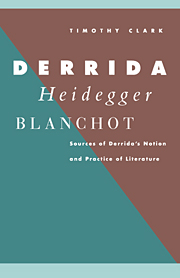1 - Overcoming aesthetics: Heideggerian Dichtung
Published online by Cambridge University Press: 15 August 2009
Summary
Although the aesthetic category ‘literature’ is relatively modern, ‘it is nonetheless true that the whole history of the interpretation of the arts of letters has moved and been transformed within the diverse logical possibilities opened up by the concept of mimesis’ (Derrida: Diss, p. 187).That the literary is a mimesis (imitation) of some sort seems self-evident, whether it be a mimesis of ‘reality’, ‘ideas’, ‘emotions’, or even, in a formalist mode, ‘itself’.
Before the nature and limits of this conception can be examined, some preliminary distinctions must be made. First, mimesis and ‘representation’ are not to be too easily identified. The later discussion of Heidegger concerns a notion of mimesis that could not possibly be translated in terms of ‘imitation’ and ‘re-presentation’. Secondly, the notion of ‘representation’ is itself not univocal. For the purposes of the present discussion, two senses of ‘representation’ may now be distinguished.
A useful starting-point is to follow Heidegger's analysis of representation in relation to Descartes's Meditations, its establishment of the cogito me cogitate as the ground of modern metaphysics.
The traditional account of the Meditations runs along something like the following lines. In his attempt to establish a sure basis of knowledge against the dominance of dogmaticism and prejudice, Descartes submitted himself to a course in radical doubt. The question was asked, is there anything which I cannot cast doubt upon, anything which can serve as a solid ground of knowledge, a necessary truth? After purging himself of various apparent certainties (the existence of an external world, even the truths of mathematics), Descartes found the famous axiom cogito ergo sum (I think therefore I am) to be alone indubitable.
- Type
- Chapter
- Information
- Derrida, Heidegger, BlanchotSources of Derrida's Notion and Practice of Literature, pp. 20 - 63Publisher: Cambridge University PressPrint publication year: 1992



